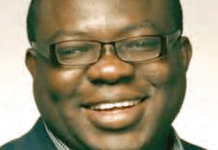
Among the defining moments in the history of pharmacy scholarship in Nigeria, the remarkable odyssey of Prof. Charles Okechukwu Esimone will stand out as one of the greatest. Like a catalytic dynamo, he has, from his university days, consistently demonstrated that his foray into Pharmacy was destined to trigger transformative disruptions that would leave indelible footprints.
Due to the ease with which he formulated drugs, even as an undergraduate, Esimone was dubbed “the formulator” by his classmates. Amazingly, over the years, he has, with the same “ease”, reformulated the boundaries of scholastic and professional excellence, birthed revolutionary discoveries, proffered ground-breaking solutions, and set sterling records that will inspire generations of luminaries to come.
One of such records is his becoming a professor at an age when many of his peers in academia and other practice settings were still struggling to find their feet. Esimone actually holds the record of being the youngest pharmacist to become a professor in Nigeria at age 37. He naturally attributes this feat, as well as numerous others that he has achieved as an academic pharmacist and presently as vice-chancellor of Nnamdi Azikiwe University, Awka, to the mercies of God Almighty.
However, anyone familiar with Esimone’s meteoric rise would concur that, even with divine help, the path through which he permanently etched his name in the top echelons of pharmaceutical scientists was not paved with roses. Indeed, his legend is best summed up by these immortal lines from one of Henry Wordsworth Longfellow’s poems: “The heights by great men reached and kept were not attained by sudden flight, but they while their companions slept, were toiling upward in the night.”
Rendezvous with destiny
Esimone’s “toiling upward in the night” that had begun since his early years at University of Nigeria, Nsukka (UNN), assumed a more decisive dimension, when he became a supervisee of Prof. Michael Umale Adikwu in his final year. While his initial intention was to proceed to northern Nigeria to tap into the gaping goldmine of community pharmacy, Adikwu redirected his attention to his potential as a powerhouse of scientific knowledge that would flourish best in academia. According to him, “Prof. Adikwu illuminated a path I never considered. He showed me the greener pasture I was looking for through academia and asked me to go get it.”
Though the path was seemingly daunting and non-lucrative, Esimone not only accepted the challenge to be an academic pharmacist at UNN but also heeded the advice to unleash his genius in the field of pharmaceutical microbiology. This was a daring move that only a natural-born pathfinder like Esimone could have contemplated. At that time, pharmaceutical microbiology, previously taught by mostly expatriates in the Department of Pharmaceutics, had become unpopular at UNN. This was because the expatriates (mainly Indians and Egyptians) had left the country. So massive was the chasm created by the exodus that the course had to be moved to the Department of Microbiology in the Faculty of Biological Sciences.
Despite still being an intern pharmacist, Adikwu challenged Esimone to develop the curriculum for Basic/Introductory Pharmaceutical Microbiology, which he brilliantly did. That marked the return of the course to the Faculty of Pharmaceutical Sciences.
Greater heights
A few years after obtaining his postgraduate degrees (1998 and 2002 respectively), Esimone was invited to a training in biotechnology, which was still alien to Nigeria as at then. His superlative mastery of the subject paved the way for him to obtain a Humboldt fellowship in pharmaceutical microbiology and biotechnology in Germany.
It was during this fellowship that the distinguished researcher developed his well-known expertise in recombinant DNA-based assay technology. This would ultimately lead to the development of assay protocol that revolutionised antiviral screening of natural products against HIV and other pathogens. Suffice to say that the same technique was recently deployed in testing for anti-COVID properties in plant products.
Following his trailblazing research outcomes during the Humboldt fellowship, Esimone was again awarded a fellowship to develop malaria vaccine in the US. Shortly after, he took up employment as senior lecturer, at Nnamdi Azikiwe University, Awka (UNIZIK).
“Too phenomenal for Readership”
While Esimone was busy in the US, something spectacular was happening back in Nigeria. The management of UNIZIK that had been so impressed by the profundity of his research output decided to send his papers to external assessors, so he could possibly be promoted to the post of Reader.
To the surprise of the school management, the assessors declared that his brainpower was already beyond that of a Reader – he was recommended for promotion as full professor! The university could not agree less – and thus did Esimone establish himself as a phenomenon in the annals of pharmacy scholarship in the country. He became not just UNIZIK’s first professor of Pharmacy but also the first professor of Pharmaceutical Microbiology in South-eastern Nigeria.
The renowned scholar would go on to record several other accomplishments, including collaboration with the United States Pharmacopoeia to develop the curriculum for Pharmaceutical Quality System for implementation in pharmacy schools. He also collaborated with expatriates from universities in the United States to establish the department of Forensic sciences at UNIZIK.
Esimone has equally served in the board of international and local committees, representing Africa and Nigeria in the global stage. He was a member of the five-man committee sent to ICGEB, Trieste, Italy, for discussions on the manufacture of Biosimilars and development of biotechnology (Biopharmaceutics curriculum) in Nigeria. He was also a member of the committee of deans that initiated Supply Chain Management curriculum in Nigerian universities
Higher calling
After years of meritorious exploits in expanding the frontiers of pharmaceutical science and education, Esimone stepped up to serve as the deputy vice chancellor (Academic) of UNIZIK for two terms. This experience, coupled with his natural administrative acumen, the repeated trainings he got from the DIES programme (organised by DAAD (Deutscher Akademischer Austauschdienst), as well as his passion to consolidate his successes at the faculty level, prompted him to vie for the vice-chancellorship of the institution.
Since assumption of office, Prof. Esimone, who hinges his administration on ACADA, an acronym for Academic Excellence, Community Service, Administrative Reforms, Discipline and Advancements, has progressively moved the university forward in all the areas pointed out above. This has led to improved ranking of the university in all fronts.
Despite his current administrative engagements, however, the celebrated vice-chancellor is still actively involved in pharmaceutical research. According to him, “I am heavily interested in working with anybody to produce the first vaccine from Nigeria.” With well over 200 publications to his credit, he is acclaimed as one of the most published scholars in Nigeria.
Awards and recognitions
Esimone, who is a native of Akwaeze in Anaocha LGA of Anambra State (though born in in Tiko, in South-West Cameroon), has been honoured with several recognitions and awards in the course of his illustrious career. Aside from the Humboldt fellowship that he considers most fulfilling because it birthed the subsequent honours, he also holds the honorary title, “The Name in Science”, as awarded by the Socrates Committee of Oxford University. He won the 2009 award of the Bright Ideas Contest of the African Network for Drugs and Diagnostics Innovation (ANDI) in 2009. He also won the Young Professor Award of the Pharmaceutical Society of Nigeria (PSN), Enugu State Chapter, in October 2009 and the Gold Mentor Award of the Young Pharmacists Group of the Pharmaceutical Society of Nigeria (PSN), November 2009.
Prof. Esimone is a recipient of various national and international grants and a reviewer to several national and international journals. He is a Fellow of the Nigerian Academy of Science, the Nigeria Academy of Pharmacy and the Pharmaceutical Society of Nigeria. He is also the pioneer national president of the Nanomedicine Society of Nigeria.










